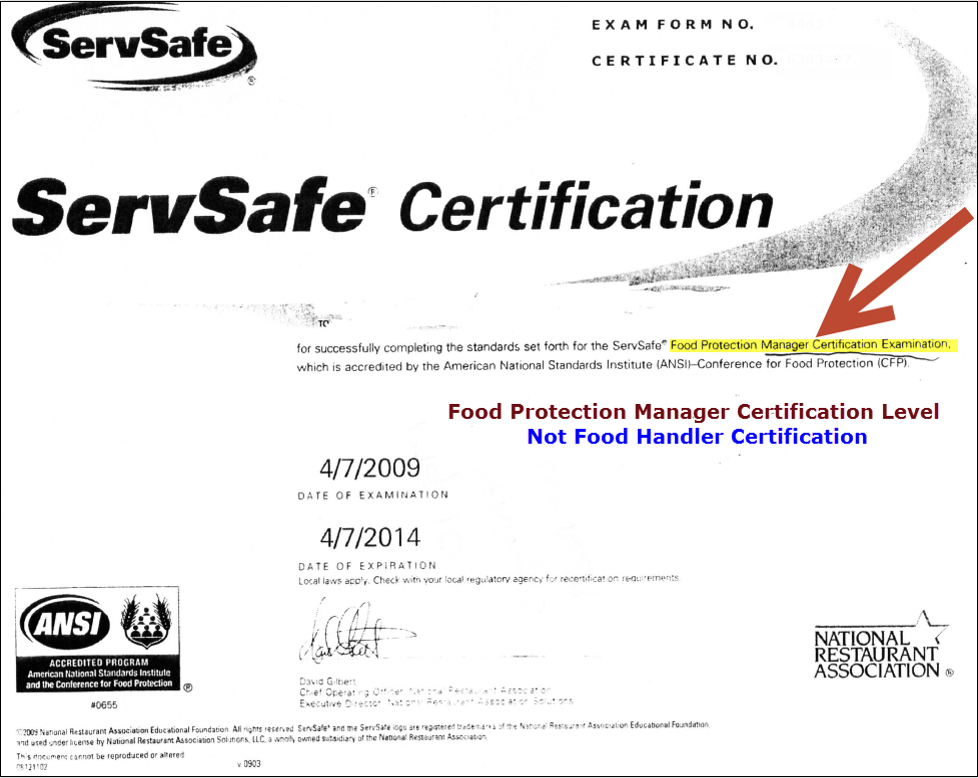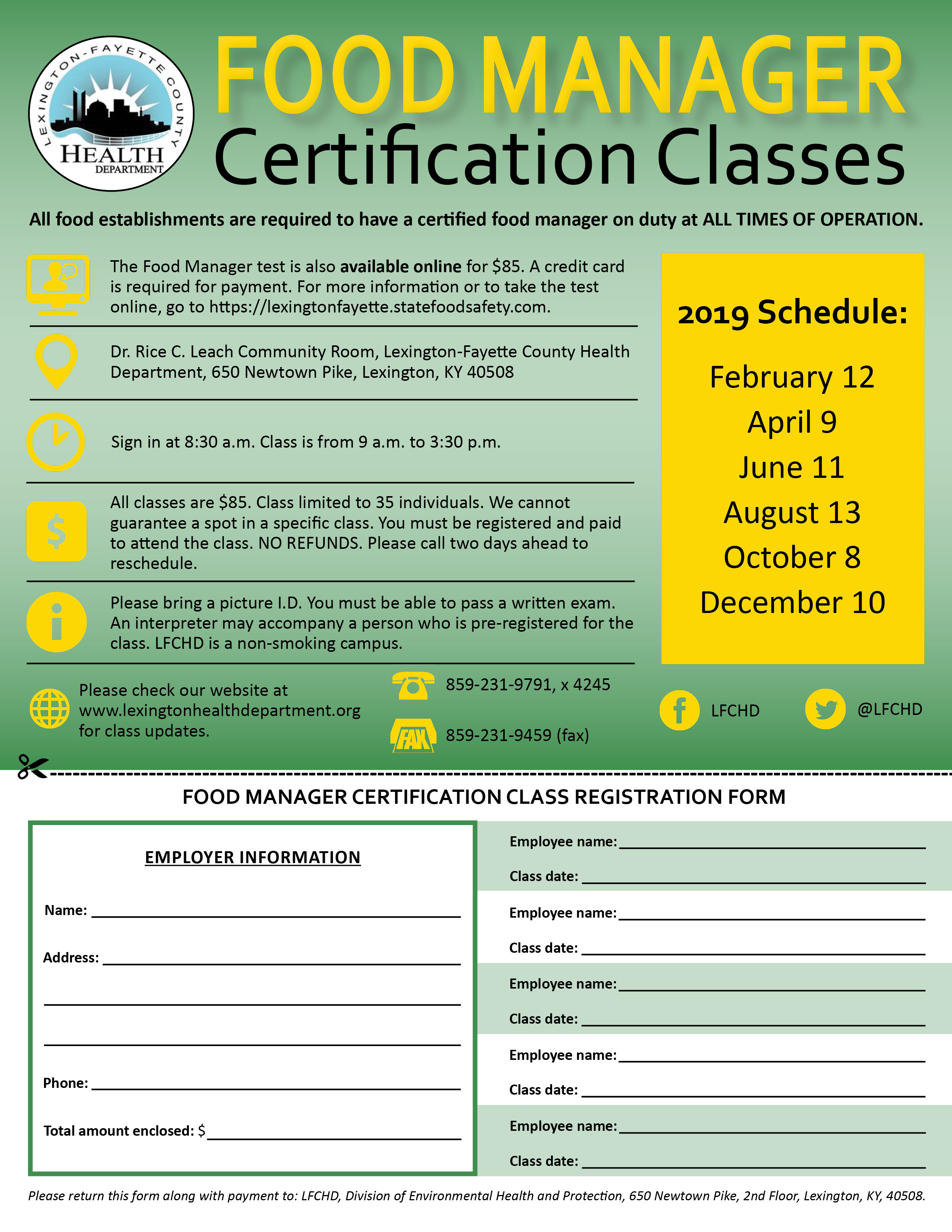Expert Training for Food Supervisor Qualification Made Simple
The value of food manager qualification can not be downplayed, specifically in an era where food security is extremely important. Expert training programs have progressed to enhance the qualification procedure, giving crucial knowledge and functional abilities essential for effective food monitoring. These programs cover important topics, from foodborne disease prevention to conformity with health regulations. The true value of this training prolongs past simple certification; it has extensive ramifications for career improvement and public health. Recognizing how these elements adjoin might reveal possibilities that are frequently ignored.
Significance of Food Manager Certification
The relevance of Food Manager Qualification can not be overemphasized in today's food service sector. This accreditation indicates that food managers have the essential expertise and abilities to ensure food safety, maintain health criteria, and maintain regulatory compliance. In an age where foodborne illnesses can have serious consequences, the role of a certified food manager comes to be essential in guarding public health and wellness.
Food Manager Qualification not just equips people with the know-how to identify and minimize food safety and security threats but likewise enhances the trustworthiness of the establishment. Consumers are significantly critical; they seek assurance that their dining experience is safe and sanitary. Accreditation acts as a mark of expertise that can attract and keep consumers.
Furthermore, a licensed food manager can lead team training, fostering a society of safety and security and accountability within the work environment (ServSafe Manager). Investing in Food Supervisor Accreditation is a financial investment in high quality, safety, and the overall success of food service operations.
Overview of Expert Training Programs
Professional training programs for food supervisor accreditation are developed to offer extensive education on food safety practices, regulatory compliance, and danger administration. These programs intend to equip food solution experts with the knowledge and abilities necessary to make sure secure food handling and prep work in different setups, consisting of dining establishments, providing services, and institutional food operations.
Usually, specialist training programs include both sensible and academic parts, allowing participants to engage with real-world situations. The educational program frequently includes vital subjects such as foodborne illnesses, correct food storage methods, hygiene procedures, and worker training approaches. These programs are frequently upgraded to straighten with the newest industry criteria and laws, guaranteeing that participants receive appropriate and current info.
Several programs provide adaptable shipment approaches, consisting of in-person classes, online training courses, or a hybrid strategy, accommodating different knowing preferences and schedules. Upon successful completion, individuals normally obtain certification, which is commonly acknowledged by local health divisions and regulative agencies, boosting their job potential customers within the food service sector. Generally, professional training programs play an essential role in promoting a culture of food security and conformity among food managers and staff.
Key Topics Covered in Training
Food security is an essential focus in food manager certification training, incorporating a range of crucial subjects that ensure participants are well-appointed to deal try this website with food securely. Among the main topics covered is the value of individual hygiene, which consists of correct handwashing techniques and the importance of visite site maintaining sanitation in food preparation locations.
In addition, the training addresses foodborne health problems, describing the different microorganisms that can infect food and the symptoms related to these health problems. Individuals discover the conditions that promote bacterial development, which is vital for protecting against break outs.
Temperature control is one more vital subject, highlighting the secure food preparation, cooling, and storage temperatures essential to reduce risks. The training likewise covers cross-contamination prevention approaches, guaranteeing that raw and prepared foods are handled appropriately to stay clear of harmful communications.
Additionally, food safety regulations and standards, such as those set forth by the FDA and regional wellness departments, are talked about to give a comprehensive understanding of conformity needs. Last but not least, reliable parasite control measures are taken a look at to protect food establishments from infestations that can compromise safety and security. Jointly, these topics lay a solid structure for secure food monitoring techniques.
Advantages of Expert Training
Exactly how can expert training boost food safety methods within a facility? Specialist training equips food supervisors with thorough knowledge of food security policies, industry criteria, and ideal techniques. This fundamental understanding is critical for maintaining a tidy and secure cooking setting, eventually minimizing the risk of foodborne illnesses.
Furthermore, expert training promotes an aggressive method to food safety and security by highlighting safety nets and hazard evaluation. Supervisors trained by sector specialists can effectively determine possible dangers and apply approaches to minimize them. This not just secures customers however additionally enhances the facility's track record and credibility.
Furthermore, specialist training encourages a society of continual improvement. Food managers who involve in recurring education are better prepared to adapt to new policies and fads in the food solution industry. This flexibility can result in enhanced operational effectiveness and price savings.


Steps to Accomplish Accreditation
Accomplishing accreditation in food management calls for an organized discover here strategy that encompasses several essential actions. People have to choose a certified training program that offers comprehensive coursework in food safety and security, sanitation, and monitoring concepts - Safe Serve Manager. These programs often provide beneficial resources, including study materials and practice exams
Following, prospects ought to proactively take part in the training sessions, whether in-person or on-line, to enhance their understanding of important topics such as foodborne diseases, personal health, and appropriate food storage space strategies. Engagement in conversations and practical workouts can even more enhance knowing.

Once appropriately prepared, prospects can schedule and take the exam. Successful conclusion normally requires achieving a certain passing rating, which demonstrates a thorough grip of food safety criteria.
Verdict
In recap, expert training for food supervisor qualification plays an essential function in guaranteeing food safety and security and compliance with regulative standards. The organized programs offer necessary expertise and practical skills essential for managing foodborne illnesses and hygiene protocols properly. By facilitating ease of access and improving profession prospects, these training campaigns contribute dramatically to public health and wellness. Inevitably, achieving food manager qualification via professional training not just boosts individual competencies however additionally promotes a more secure food atmosphere for all.

Specialist training gears up food managers with detailed expertise of food safety policies, market criteria, and best practices.In summary, expert training for food supervisor certification plays a vital duty in making certain food security and conformity with regulatory requirements (ServSafe Food Manager Certification). Eventually, attaining food manager certification through professional training not only raises private expertises yet also promotes a more secure food atmosphere for all